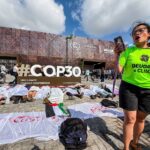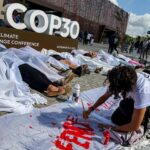COP 30: Nigerian Groups Say No to Monetizing Natural Resources
By prince Benson Davies


 Environmental rights organizations in Nigeria have strongly condemned Vice President Kashim Shettima’s call for new finance mechanisms to harness the economic value of nature, describing it as a blatant attempt to commodify the environment. The groups, including Corporate Accountability and Public Participation Africa (CAPPA), Health of Mother Earth Foundation (HOMEF), and Environmental Rights Action/Friends of the Earth Nigeria (ERA/FoEN), argue that such a move would undermine true climate justice and prioritize corporate interests over the rights and aspirations of Nigerian citizens. They urge the government to instead focus on building a sustainable and equitable future, prioritizing renewable energy, agroecology, and community-led conservation practices that protect biodiversity and ensure food sovereignty.
Environmental rights organizations in Nigeria have strongly condemned Vice President Kashim Shettima’s call for new finance mechanisms to harness the economic value of nature, describing it as a blatant attempt to commodify the environment. The groups, including Corporate Accountability and Public Participation Africa (CAPPA), Health of Mother Earth Foundation (HOMEF), and Environmental Rights Action/Friends of the Earth Nigeria (ERA/FoEN), argue that such a move would undermine true climate justice and prioritize corporate interests over the rights and aspirations of Nigerian citizens. They urge the government to instead focus on building a sustainable and equitable future, prioritizing renewable energy, agroecology, and community-led conservation practices that protect biodiversity and ensure food sovereignty.
Speaking in Belém, Brazil, ahead of the ongoing United Nations Climate Change Conference (COP 30), the Vice President had urged the creation of finance systems that would monetise the nation’s natural assets.
‘
But the groups, including Corporate Accountability and Public Participation Africa (CAPPA), Health of Mother Earth Foundation (HOMEF), Environmental Rights Action/Friends of the Earth Nigeria (ERA/FoEN), Lekeh Development Foundation, and Social Action, warned that such a move undermines true climate justice.
In a joint statement, they said the proposal reflects “a concerning misinterpretation of true climate justice.”
According to them, by suggesting that Nigeria’s forests, water bodies, land, and biodiversity should be monetised for financial gain, Nigeria is aligning with corporate and market-driven interests rather than with the rights and aspirations of its people, especially those on the front lines of climate impacts.
“We find this framing deeply troubling because it reduces nature – our collective heritage and source of life – to a mere economic asset. This approach, often disguised under concepts like ‘nature-based solutions,’ ‘carbon markets,’ and ‘carbon offsetting,’ encourages the financialisation of the environment, turning ecosystems into speculative commodities traded for profit.
“Such schemes have historically led to the destruction of ecosystems, as they prioritise financial returns over preservation. They also disrupt local food systems by displacing smallholder farmers and indigenous communities from their ancestral lands, worsening food insecurity and rural-urban poverty,” the statement said.
Furthermore, the groups argued that commodifying nature not only violates human dignity and cultural rights but also strips indigenous and local peoples of their identity and traditional stewardship roles.
“It opens the door to corporate capture and greenwashing, where polluting companies buy carbon credits instead of cutting emissions, continuing to destroy the planet while pretending to be ‘climate champions.’ At the same time, this model risks an erosion of national sovereignty, as it mortgages Nigeria’s ecological wealth to volatile international carbon markets and external investors,” they warned.
The organisations urged Nigeria to resist the temptation to trade its ecological wealth for short-term financial gain. They called on the government to instead invest in building a sustainable and equitable future.
They explained that this means “prioritising renewable energy, including solar, wind, and other clean technologies that are proven to be environmentally friendly and accessible to all. It also requires supporting agroecology and community-led conservation practices that protect biodiversity while ensuring food sovereignty and resilience.”
They also stressed the importance of inclusive dialogue by the government, civil society, indigenous peoples, and local communities before Nigeria advances any policy or position on environmental or climate issues, adding that climate action “must be people-centred, rooted in justice, equity, and the protection of human and environmental rights, not dictated by the profit motives of corporations or global carbon traders.”
“We know that true climate justice demands that nature remains a shared trust, not a tradable commodity. It is the duty of the State to safeguard the environment, human culture, and dignity, not to exploit them in pursuit of inhuman market interests,” the statement concluded.
 The New Experience Newspapers Online News Indepth, Analysis and More
The New Experience Newspapers Online News Indepth, Analysis and More
